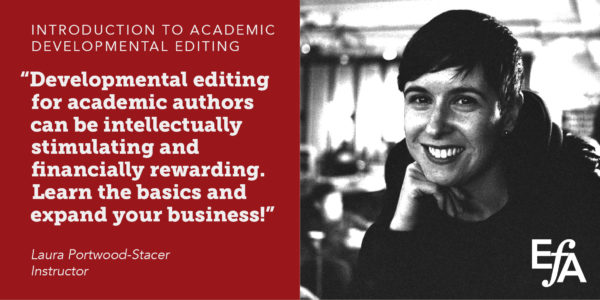Description

This 8-week online course introduces students to the role of developmental editing in academic publishing contexts, the skills needed to perform effective developmental assessments and edits on academic manuscripts, and the services freelance developmental editors offer to academic clients. The course is designed for working editors who wish to add academic developmental editing to their portfolio of services or tailor an existing nonfiction developmental editing practice to academic clients. The course will also be appropriate for academics with some editing experience who are considering branching out into professional freelance editing.
The course will include a combination of written instructor lectures, PowerPoints, video recordings, suggested reading assignments, forum discussions, and editorial practice assignments (which may be submitted to the instructor for private critique if students wish). Sample manuscripts will be provided for practice editing, though students are also welcome to practice on any academic manuscripts they’re able to procure themselves. Live Q&As with the instructor will be held on Wednesday, September 23rd; Wednesday, Oct. 7; and Wednesday, November 11th. All will take place 1-2pm EST.
Learning Objectives:
- Understand the academic publishing process and how developmental editing fits into it
- Gain knowledge of the craft of academic developmental editing
- Practice executing the most common tasks in academic developmental editing
- Become aware of best practices for networking, marketing, interacting with clients, and other aspects of running a successful freelance editing business
The course will cover the academic publishing process; the scope of academic developmental editing; assessment and editing of academic manuscripts; assessment and development of academic book proposals; presenting feedback to clients; building a network of academic clients; marketing your services; setting rates; and more!
At the end of the class, students will be able to:
- Understand the economic landscape of academic publishing for both journal articles and books including who pays for published academic texts.
- Understand the timelines, processes, and personnel of academic publishing from query to submission to peer review to production to publication to promotion.
- Understand the points at which developmental editors may be called on to work on a manuscript and whom they will be contracting.
- Identify types of editing that may fall under the purview of a developmental editor (e.g. structural, substantive, line editing).
- Consider how audiences and markets differ for different types of academic manuscripts and how these differences shape the work of the developmental editor.
- Understand the role of the manuscript assessment in developmental editing.
- Understand the importance of argument, organization, narrative, tone, and style in academic publications and how target audience affects all these aspects of academic writing.
- Learn how to diagnose and solve problems of argument, organization, narrative, tone, and style in academic book manuscripts.
- Practice assessment on an academic book manuscript (or excerpt).
- Learn the standard components of an academic book proposal and what purpose each component serves in the academic publishing process.
- Identify common mistakes in academic book proposals.
- Learn how to approach a hands-on developmental editing project in MS Word, including use of Track Changes, Comments, and in-text insertions.
- Understand the purposes of an editorial letter and how those purposes shape what information is included and how it is presented.
- Learn the basics of setting up a freelance editorial business targeting academic clients.
- Consider matters of pricing, rates, and billing.
- Discuss strategies for marketing, networking, and attracting desirable clients.
Laura Portwood-Stacer, PhD, runs Manuscript Works (manuscriptworks.com), which offers freelance developmental editing services and publication consulting to academic authors. She serves clients in media studies, technology studies, cultural studies, gender studies, ethnic studies, and related fields. Her clients have published books with scholarly presses such as Princeton University Press, MIT Press, University of California Press, Stanford University Press, Duke University Press, and many more. She holds a PhD in Communication from the University of Southern California and is the author of Lifestyle Politics and Radical Activism (Bloomsbury Academic, 2013), a book based on her doctoral dissertation. Before becoming a developmental editor, Laura taught courses in media studies at New York University and the University of Southern California.
Our online courses are conducted through Sakai, a learning management system (LMS). You never need to be at your computer at any specific hour. More information about how these asynchronous classes are conducted is available here. Information on our refund policy is available here. All participants in EFA courses must abide by our anti-harassment policy, which you can find here.


